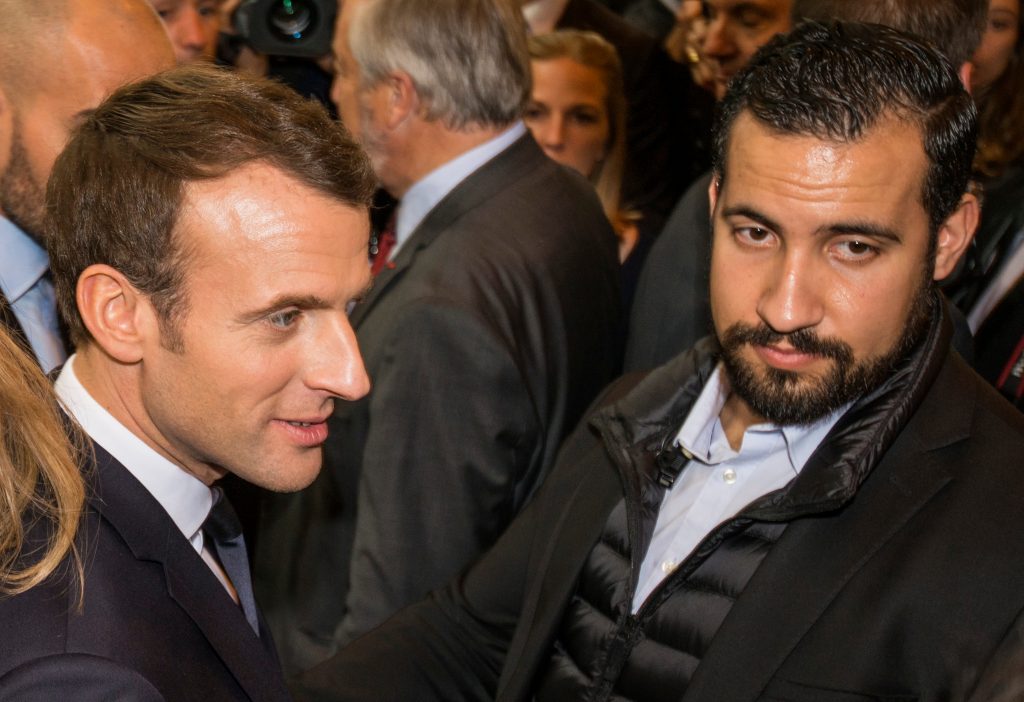Calm Down

On Friday night, January 17, 2020, Emmanuel and Brigitte Macron went to the theater Bouffes du Nord to see a play. Given the public invective against Macron and his attempts at retirement reform, their date night seems to have been a defiant effort not to remain isolated in the Elysées Palace. But then their location was tweeted by the independent journalist Taha Bouhafs.
There is, curiously, a kind of history between Bouhafs and Macron; indeed, the young journalist (a member of the far left La France Insoumise and associated with Là-bas si j’y suis) was associated with the first real scandal of Macron’s term. Not quite two years ago, on May 1, 2018, Bouhafs took a video of what he believed to be a policeman beating a protester. (Because of course there was a protest on May Day.) Upon closer examination, the supposed policeman turned out to be Alexandre Benalla, Macron’s hulking security chief/advisor/aide.
Here:

And here.
(Benalla is still around, was called to testify before the Senate, seems somehow not to have suffered any consequences except being fired.)
But back to the tweet about Macron in the audience, which seemed to target him by giving his location in real time. Demonstrators soon surrounded the theater, the police called for reinforcements, a group of protesters managed to get inside briefly, and at the end of the evening–for the Macrons stayed to the end–they had to be “exfiltrated” to safety.
Taha Bouhafs was taken into custody for about twenty-four hours and questioned on possible charges of “organizing an undeclared demonstration” and being part of “a group formed to commit violence or damages to property.” He was released, and his lawyer acknowledged that he was not at the theater by pure chance. About an hour before curtain time, he had gotten a tip that Macron would be there, and so he was too; if something happened, he wanted to cover it. He did not know there was a demonstration outside until he learned of it by way of social media–which means that he is also one of those irritating people who keeps checking his phone during a movie or play (Libération, January 18, 2020; Libération, January 18, 2020).
His tweet, however, seems in line with that story; there was also the fact that someone else had tweeted the location twelve minutes before Bouhafs did, as the compilation tweet, below, indicates. In Bouhafs’ message, Macron is in the grayish-blue jacket, head turned slightly to the right: “I’m currently in the theater of Bouffes du Nord (Metro stop La Chapelle), 3 rows behind the president of the Republic. Activists are somewhere in the area and are calling everyone to turn up. Something is being prepared . . . the evening is at risk of being eventful.”
The 12-minutes-earlier tweet, from “The Strike Committee of the Twelfth Arrondissement of Paris,” was marked “Urgent,” and stated “Macron “HAS JUST ENTERED the theater of Bouffes du Nord to attend a play. He is mocking us! Everyone be in front of the theater to give him the reception he deserves!”
Bouhafs was released to a small welcoming committee; activist attorney Raquel Garrido referred to his detainment as a “lettre de cachet,” the old regime formula for arrest and indefinite imprisonment with neither charges nor trial; referred to him as “our Gavroche,” the urchin from Les Misérables; and then, “Vive la liberté and down with the presidential monarchy.”
Bouhafs says here, very briefly, that he was held for 24 hours, going from cell to cell, being questioned simply for having tweeted that the president was in the theater; he was accused of attempting to organize a demonstration.
This particular tweet, however, is also of interest because of the retweet by Raquel Garrido. She is an attorney and journalist, the former spokesperson of Jean-Luc Mélenchon of La France Insoumise, and the partner of prominent LFI member and Deputy Alexis Corbière.
She also retweeted, close to the same time, something from an account called Gilets Jaunes Caen which showed a mock reenactment of the execution of Louis XVI (executed January 21, 1793), adding the suggestion that this was a “preview” of the planned strike on Tuesday, January 21. The original tweet, which implied the same treatment for Macron, has since been taken down by twitter as a violation of their guidelines, though it is visible on this broadcast:
In his own tweet, which would be hilarious if the matter were not so serious, Mélenchon stated, “What struck me, as it struck Raquel Garrido, is the deep rootedness of the French Revolution of 1789 in the spirit of the French people. The French are glorified by this event which established the People as the sole sovereign.” https://twitter.com/JLMelenchon/status/1218945856432373760?s=20
Then, when Garrido probably should have gone off twitter for awhile, she replied to one of her critics, who accused her “of confusing political opposition and appeals to murder.” Her response, suggesting that he should reread French history, did not help matters: “The death of Louis XVI is precisely an act of foundation of the Republic. Admit that the presidential monarchy is incompatible with the Republic.”
Continuing her verbal rampage, she accused Macronists of lacking a sense of humor.
Macronist friends, the French people [use] mockery and historical references that are profoundly Republican, you should appreciate and welcome it. You completely lack any sense of self-deprecation, as when Macron brought criminal charges against those who were taking down his photographs in the mayoralty offices. (That’s another issue.)
So there we are.
The current problem for France is what seems increasingly like the ill-considered decision, during Chirac’s administration, to change the presidential term from the original seven years to five years, and to put it on the same schedule as the National Assembly elections. We all know, in the United States, that a four-year term can seem like an eternity. (Are we there yet?) But there is a corrective in the mid-term elections (as well as state elections), and energies spill into campaigns for local representatives; a victory in the House of Representatives by the party that does not hold the presidency can have real consequences. The French have the European Parliament elections (in 2019) and the upcoming municipal elections (in March, 2020), but neither of those provide anything but a symbolic check on the government in office. The original off-year elections of the National Assembly during a presidential term provided a real check, and that is now gone.
Significantly, two of the décrocheurs, the removers of portraits of Macron, were recently convicted on appeal and sentenced to fines of 250 euros, along with six others to 500 euros. The Tribunal of Lyon, whose initial verdict was appealed by the state, had called their action a “legitimate” form of of protest, “the necessary substitute for a dialogue that is impractical” between the president and the people (Le Monde, January 14, 2020). A version of that legal theory is behind the insistence on the right to protest and symbolic actions. But even though the French have a history of going into the streets, I’m inclined to see a structural problem in the government that provides no outlet for disagreement, especially given Macron’s overwhelming majority in the National Assembly–no outlet, that is, except for protests.
But there is also something else going on, and that is the corrosive effect of social media.
If we want to delve into the French Revolution, we can see the tweets of today as the libelles of the prerevolutionary period of the eighteenth century, the cheap pamphlets described by the great historian of France, Robert Darnton: “[The libelles] slandered the court, the church, the aristocracy, the academies, the salons, everything elevated and respectable, including the monarchy itself, with a scurrility that is difficult to imagine today” (Darnton, p. 29). (He wrote this before Facebook.) The constant agitation felt by habitués of social media, the anonymity of much of it, the recirculation of deliberately false statements–as with the libelles–has a deeply corrosive effect.
As we know.
===========================================
Header image from Shutterstock.com.
Darnton, Robert. The Literary Underground of the Old Regime. Harvard University Press, 1982 edition.